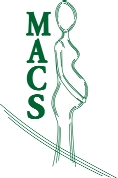
The Centre for Mother, Infant, and Child Research
at the Sunnybrook Research Institute
Fully affiliated with the University of Toronto

The Centre for Mother, Infant, and Child Research
at the Sunnybrook Research Institute
Fully affiliated with the University of Toronto
 ISRCTN72654148 |
Multiple Courses of Antenatal Corticosteroids for Preterm Birth Study
|
Multiple Courses of Antenatal Corticosteroids for Preterm Birth Study (MACS)
Participant Information Sheet
What is preterm birth?
Preterm birth refers to babies born before they are 37 weeks along in the pregnancy. Preterm birth is a major cause of illness and even death. One of the most acute problems is called "respiratory distress syndrome" or RDS. Preterm babies get RDS because their lungs are not mature and do not produce a substance called “surfactant.” Babies need surfactant in order to have normal lung function. When babies get RDS they have difficulties breathing and often require oxygen and the use of a machine to help them breathe. Another problem often experienced by preterm babies is "intraventricular haemorrhage" or IVH. Intraventricular haemorrhage refers to bleeding inside the baby’s brain. RDS and IVH are two conditions that often lead to long term problems and can even contribute to a baby's death.
Benefits and risks of one course of Antenatal Corticosteroids (ACS)
To help prevent the complications for your baby(ies) of being born preterm you have already received one course of antenatal corticosteroids (ACS). One course of ACS usually consists of 2 to 4 injections of corticosteroids over a 24 to 48 hour period. We know that one course of ACS will reduce the risk of RDS from 45% to 20% if your baby(ies) are born before they are 32 weeks along in the pregnancy. We also know that one course of ACS will reduce the risk of death for your baby(ies) from 12% to 7%. One course of ACS may also have some long-term benefits in terms of your baby’s(ies’) development. However, we do not know how long the benefit from this treatment lasts. Most studies suggest that this treatment is beneficial if it is given between 24 hours and 7 days before your baby(ies) are born. However, if you are still pregnant more than 7-10 days after this treatment and you remain at increased risk of preterm birth, the benefits of the first course of ACS for your baby(ies) may be less and so your baby(ies) may benefit if you are given additional courses of ACS. There are no known benefits or risks for mothers from one course of ACS, other than the discomfort from receiving the injections.
Benefits and risks of multiple courses of ACS
Several small well-designed human studies have been completed and they have found that multiple courses of ACS may reduce the risk of problems for the baby, without adverse effects, but the studies were too small to know if the benefits are real. However, because some small studies in animals have shown that ACS can result in decreased growth in the uterus and delay in the development of the nervous system, it is important to be very certain that the benefits of multiple courses of ACS outweigh the risks before this treatment is recommended generally. We therefore need a large well-designed study like this one to clarify whether multiple courses of ACS are truly beneficial. There are no known benefits or risks for mothers from multiple courses of ACS, other than the discomfort from receiving the injections. Finally, there may be unknown benefits as well as adverse effects for mothers and babies, which this study will also identify.
Why do we need a study like MACS?
We don’t know which treatment is better for your baby(ies). The only way for us to find this out is to perform a study like this one. The goal of this study is to compare multiple courses of ACS, every 14 days, until 33 weeks, as long as you are at increased risk of preterm birth, to just having one course of ACS. We will then learn which therapy is better and in the future be able to give women and their unborn babies the best treatment.
What is MACS and what does participation in MACS involve?
In order to take part in this study you should be at an increased risk of preterm birth, and be between 25 and 32 weeks along in the pregnancy. You should have already received one course of ACS 14-21 days ago. If you agree to participate in this study, your treatment will be determined by randomisation. This means that you have an equal, but random, chance of receiving more courses of ACS, every 14 days, or placebo, until 33 weeks, as long as you remain at increased risk of preterm birth. Placebo contains an ineffective ingredient in water that is completely harmless to you. This study is double-masked which means that neither you nor your doctor will choose or know which treatment you receive. This is the only way to answer the question as to which treatment is better for you and your baby(ies).
If you participate in this study, you will receive 2 injections, 24 hours apart every two weeks, until 33 weeks, as long as your doctor believes that you are at increased risk of preterm birth. If you are in the ACS group, your injections will contain corticosteroids. If you are in the placebo group, your injections will contain a placebo.
Following your delivery, information about you and your baby(ies) will be collected from your and your baby’s(ies’) medical records. The information collected will be about the presence of any problems of the prematurity in your baby(ies) and whether there are any side effects for you or your baby(ies). In addition, we will ask you to fill out a questionnaire at 3 months after the birth of your baby(ies). The questionnaire will ask you some questions about how you are feeling at the time and will also ask you about any symptoms that you may have experienced during your participation in the study. The questionnaire will take about 20 minutes to complete. We will plan to contact you approximately every 3-6 months to check that you have not moved and to check that we have the right telephone number and other contact details for you. When your child(ren) are 18-24 months old, we will ask you to return so that your child(ren) can undergo a developmental assessment. We may also contact you at a later time to ask if you and your child(ren) would be willing to participate in an assessment when your child(ren) are older.
Finally, you should know, that you are free at any time in the study to refuse to participate and that your participation or decision not to participate will not effect the usual care of you or your baby(ies).
Sample Consent Form
INVESTIGATOR(S):
I acknowledge that the research procedures described on the attached form, and of which I have a copy, have been explained to me. In addition, any questions that I have asked have been answered to my satisfaction. I have been informed of the alternatives to participation in this study. The possible risks and benefits of participation have been explained to me. I know that I may ask now, or in the future, any questions I have about the study or the research procedures. I have been assured that records relating to my and my baby's(ies’) care will be kept confidential and that no information will be released or printed that would disclose my or my baby's(ies’) personal identity without my permission.
I understand that I and my baby(ies) are free to withdraw from the study at any time. I further understand that if we choose not to complete the study, that the quality of medical care for me and my baby(ies) at {insert hospital name} will not be affected.
I hereby consent to participate in "MACS".
_____________________________ _________________________________
(Signature) (Print Name)
_____________________________ _________________________________
(Witness) (Date)
The person who may be contacted about this research is:
_________________________________________________________
Who may be contacted at this telephone number:
_________________________________________________________